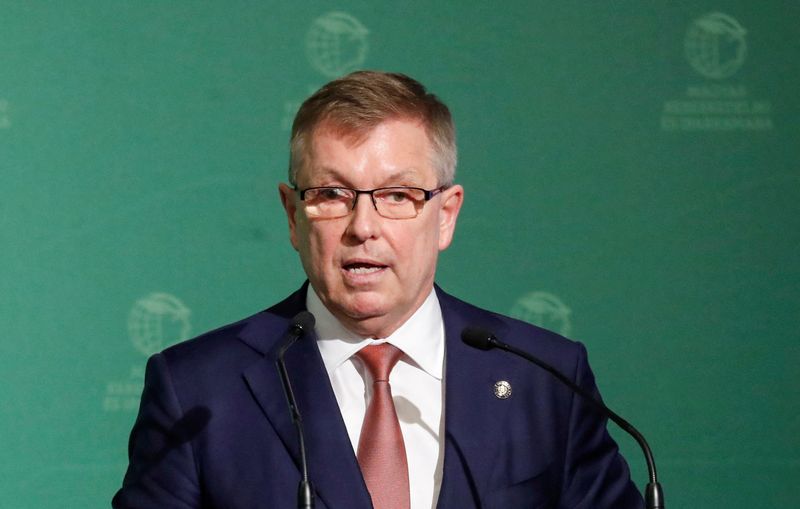
©Reuters. FILE PHOTO: Hungarian Central Bank Governor Gyorgy Matolcsy speaks during a business conference in Budapest, Hungary, March 10, 2020. REUTERS/Bernadett Szabo/File Photo
By Gergely Szakacs
BUDAPEST (Reuters) – Hungary will likely present a law amending central bank regulations to parliament in the autumn, the economy minister said on Monday, delaying changes that have pushed the forint to a one-year low and raised concerns about the independence of the bank.
Prime Minister Viktor Orban and his former ally, central bank governor Gyorgy Matolcsy, have been embroiled in an increasingly bitter political conflict since the 2022 election, trading blame for the worst surge in inflation in the European Union.
Orban’s government has drafted legislation that would expand the central bank’s supervisory board’s controls on activities outside the bank’s core tasks, such as setting monetary policy.
“Amending the law remains on the agenda,” Economy Minister Marton Nagy said at a news conference, adding that the law will not affect the bank’s core tasks.
“Talks are ongoing between the Ministry of Finance, the National Bank of Hungary and the Supervisory Board on how to present the amendment so that it withstands all checks on central bank independence.”
“There are debates and consultations on this. I think there is a greater likelihood that (it will be presented to parliament) in the fall,” Nagy said.
In an opinion dated February 26, the European Central Bank found no major problems with the legal amendment, but stressed that the expansion of the Supervisory Board’s competences should not compromise the “ability of the NBH to independently carry out a task which falls within the scope of the European System of Central Supervision”. Banks”.
The NBH has warned that changing the law erodes its independence and limits its room for maneuver in monetary policy. It will hold its monthly policy meeting on Tuesday.
Economists polled by Reuters expect the bank to return to a pace of easing of 75 basis points, lowering the base rate to 8.25% after increased market volatility, driven in part by the growing standoff between Matolcsy and Orban.
Nagy, who has repeatedly pressured the bank to cut rates more sharply to help the economic recovery, declined to comment directly on the rate decision.
“The central bank will decide what kind of rate easing cycle to implement,” he said. “I think rates will normalize. The faster rates fall, the better it will be for the economy, but the central bank has other considerations to take into account.”